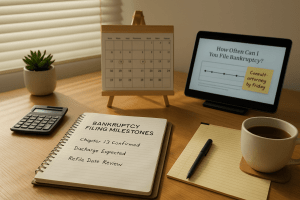
How Often Can I File Bankruptcy?
How Often Can I File Bankruptcy According to the Law? How often can I file bankruptcy? This is a crucial
Error: Contact form not found.
Lorem ipsum dolor sit amet, consectetur adipiscing elit. Ut elit tellus, luctus nec ullamcorper mattis, pulvinar dapibus leo.
How often can I file bankruptcy? This is a crucial question for anyone who has previously filed and is now facing new financial struggles. The U.S. Bankruptcy Code does not prohibit multiple filings, but it limits how frequently a discharge may be available.
In this article, we’ll explain the rules for repeat bankruptcy filings, the waiting periods between discharges, and what options you have if you need help again.
The biggest factor when asking how often can I file bankruptcy is whether you’re seeking another discharge—the court’s order that erases your debts. If you file before applicable waiting periods expire, you may be able to proceed with a case, but a discharge may not be available.
Here are the general rules:
How often can I file bankruptcy if I’m not seeking a discharge? Surprisingly, you may file again without waiting if you’re using bankruptcy for other protections.
For example, you may:
This is sometimes referred to as a “Chapter 20” strategy (Chapter 7 + Chapter 13). It is sometimes used to address secured debts after unsecured obligations have been handled, depending on the circumstances.
Filing before the waiting period ends means you may:
This can leave you still responsible for old debts and without the full benefit of filing. If you’re unsure how often can I file bankruptcy in your situation, a legal evaluation can help determine if your case qualifies for discharge or strategic filing.
Understanding how often can I file bankruptcy is essential for timing your filing correctly and understanding how timing may affect available relief. With the right guidance, you can avoid delays, protect your assets, and better understand available options—even after a previous case.
If you’re wondering how often can I file bankruptcy, it’s important to get professional guidance based on your unique situation. At Bankruptcy Attorneys, we connect individuals with experienced legal professionals who can explain your eligibility, timelines, and filing options.
Contact us today for a free legal evaluation and discuss filing timelines and whether a discharge may be available under Chapter 7 or Chapter 13.
Yes, but the waiting period between filings depends on the chapters filed and whether you received a discharge.
You can still file, but you may not receive a discharge. This may still stop garnishments or foreclosures.
Yes, you can file right away. However, to get a discharge, you must wait 4 years from the original Chapter 7 filing date.
Yes. If it’s been 8 years since your last Chapter 7 filing, you are eligible to file again and receive a discharge.
A bankruptcy attorney can review your prior case and dates to confirm your eligibility for discharge in a new filing.
Attorney Advertising. This site is a legal marketing service and does not provide legal advice. Submitting information does not create an attorney-client relationship. Results are not guaranteed.

How Often Can I File Bankruptcy According to the Law? How often can I file bankruptcy? This is a crucial
| Cookie | Duration | Description |
|---|---|---|
| cookielawinfo-checkbox-analytics | 11 months | This cookie is set by GDPR Cookie Consent plugin. The cookie is used to store the user consent for the cookies in the category "Analytics". |
| cookielawinfo-checkbox-functional | 11 months | The cookie is set by GDPR cookie consent to record the user consent for the cookies in the category "Functional". |
| cookielawinfo-checkbox-necessary | 11 months | This cookie is set by GDPR Cookie Consent plugin. The cookies is used to store the user consent for the cookies in the category "Necessary". |
| cookielawinfo-checkbox-others | 11 months | This cookie is set by GDPR Cookie Consent plugin. The cookie is used to store the user consent for the cookies in the category "Other. |
| cookielawinfo-checkbox-performance | 11 months | This cookie is set by GDPR Cookie Consent plugin. The cookie is used to store the user consent for the cookies in the category "Performance". |
| viewed_cookie_policy | 11 months | The cookie is set by the GDPR Cookie Consent plugin and is used to store whether or not user has consented to the use of cookies. It does not store any personal data. |